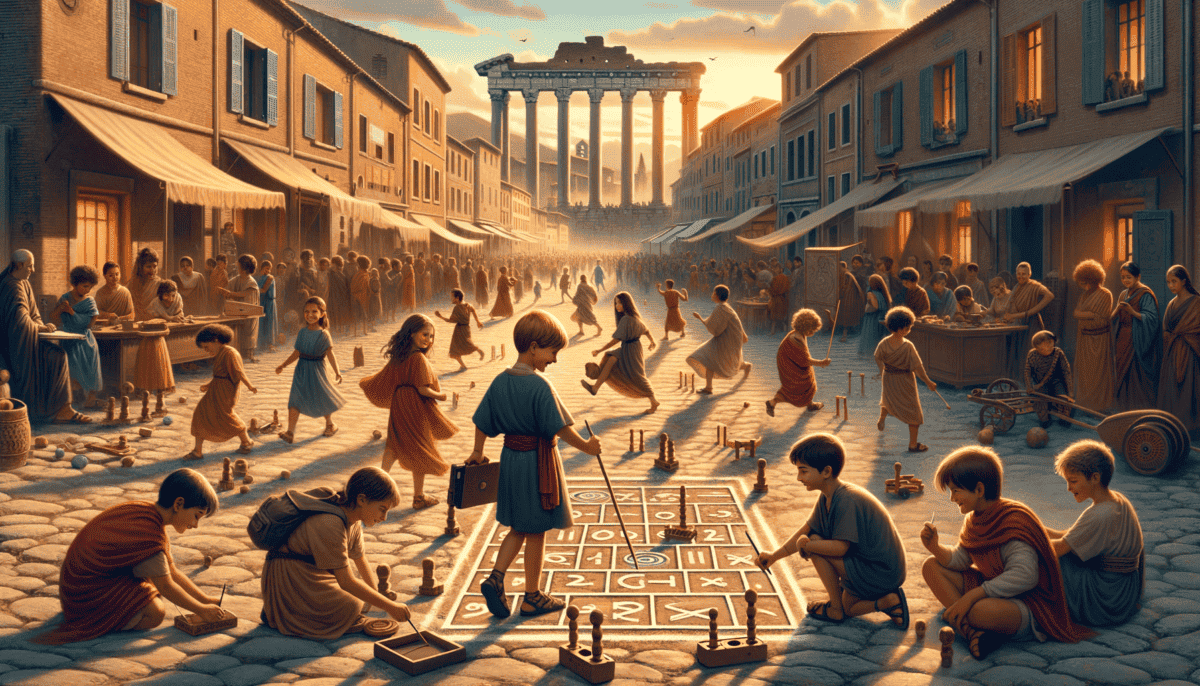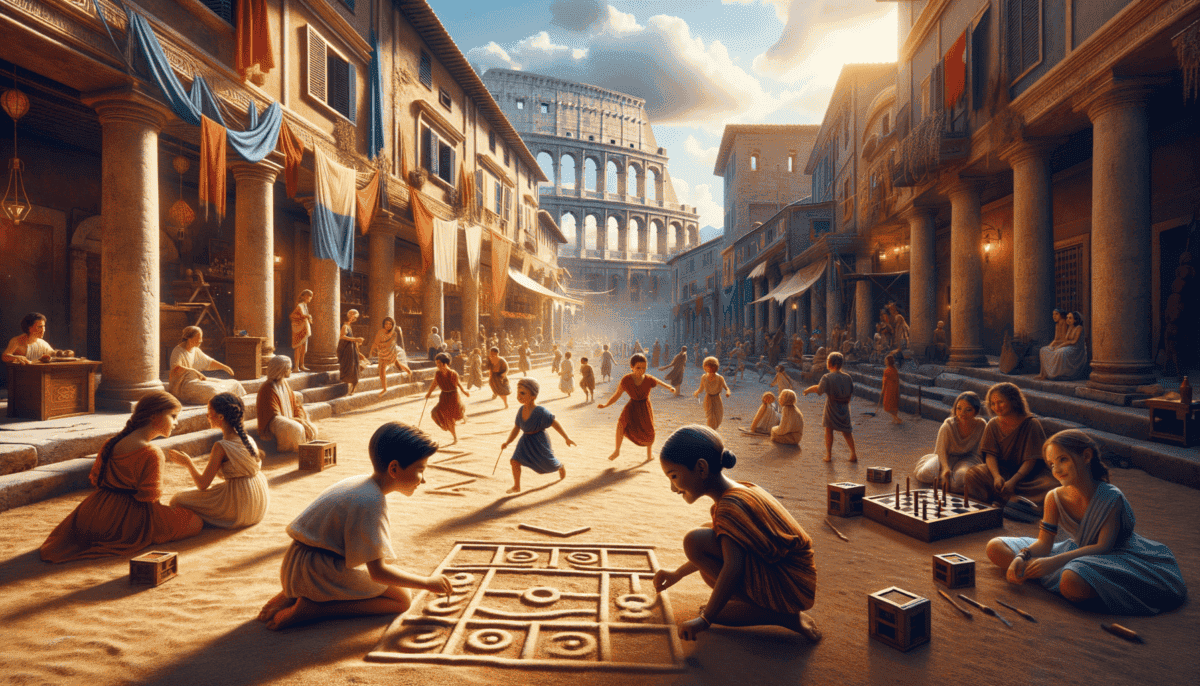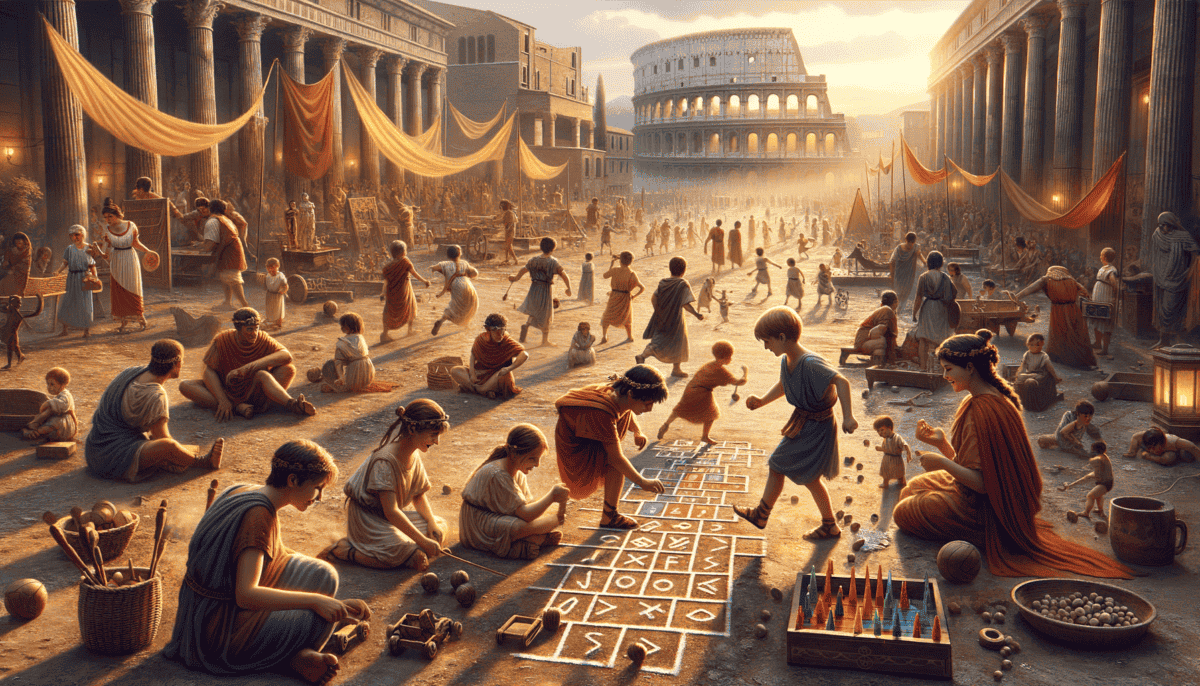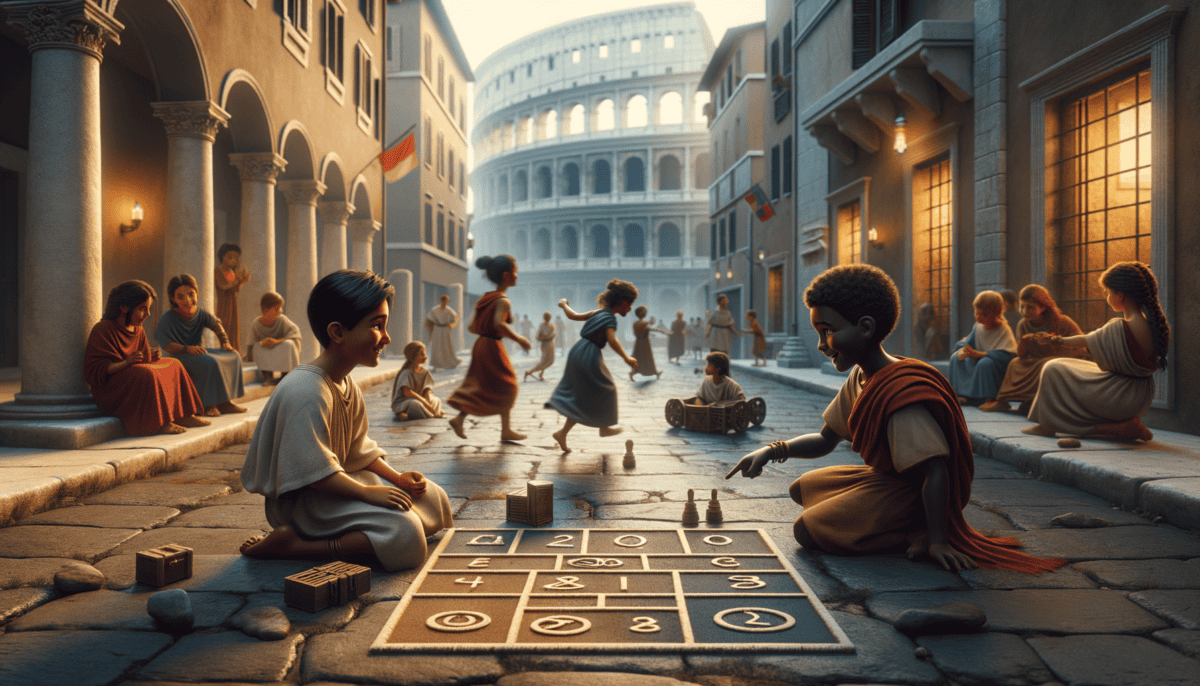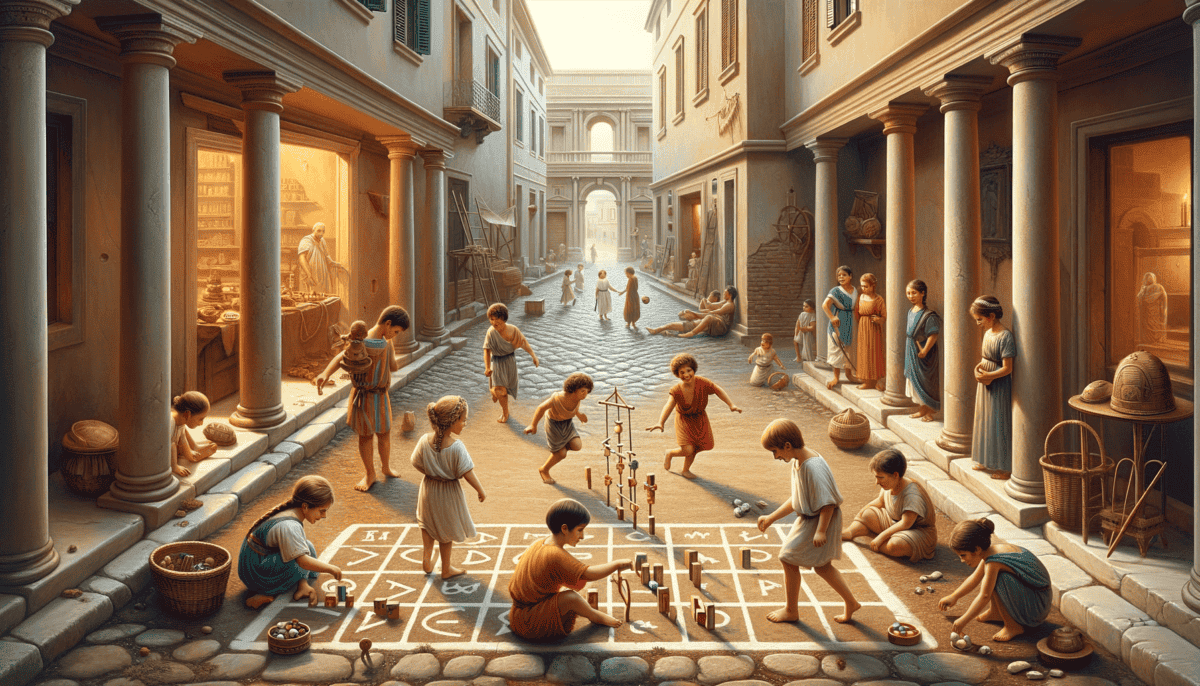A Morning in Rome
The sun peeked over the red-tiled roofs of ancient Rome. Marcus jumped out of bed, excited for a new day of fun and games. He was eight years old, with curly dark hair and bright eyes that sparkled when he smiled.
"Marcus! Time to get ready!" his mother called from the courtyard.
His little sister Lucia was already up, her six-year-old feet pattering across the stone floor. She wore her favorite blue tunic and had her dark hair in two neat braids.
"Race you to breakfast!" Lucia challenged, giggling as she ran past him.
The morning air was fresh and cool in their home's open courtyard. Beautiful flowers grew along the walls, and a small fountain trickled in the center. Their father sat at the wooden table, reading a scroll.
"Good morning, little ones," he smiled. "Ready for another day of adventures?"
Marcus grabbed a piece of warm bread and watched as his mother drizzled golden honey over it. "Can we play knucklebones after breakfast?" he asked hopefully.
"First your morning duties," his mother reminded him with a kind smile. "Then you may play."
Lucia bounced in her seat. "I want to play too! I've been practicing!"
Knucklebones was one of their favorite games. They used small bones from sheep or goats, tossing them in the air and trying to catch them on the back of their hands. It was tricky but fun!
After breakfast, Marcus helped feed the family's chickens while Lucia helped their mother weave cloth on the loom. They knew that doing their chores first meant more time for games later.
"Look what I found!" Marcus called out, holding up a smooth, round stone. "Perfect for playing Five Stones!"
Their neighbor Flavius, another eight-year-old boy, poked his head over the garden wall. "Are you playing games soon? Can I join?"
"Yes!" Marcus replied excitedly. "We'll meet in the street after chores!"
The children of their neighborhood always found ways to have fun together. Some days they played ball games, other days they had races or played hide-and-seek in the busy streets.
• Knucklebones (like modern jacks)
• Five Stones
• Ball games
• Hide-and-seek
• Racing
As Marcus finished his morning tasks, he could hear other children starting to gather outside. Their laughs and shouts filled the air with joy. This was what he loved most about living in Rome – there were always friends ready to play and new games to try.
"Can we go out now?" Lucia asked, tugging at their mother's sleeve. "I want to show everyone my new knucklebones move!"
Their mother nodded, and both children rushed to the door, ready for another exciting day of games and fun in the bustling streets of Rome. The morning sun was now high in the sky, promising a perfect day for playing with friends.
Marcus looked at his sister with a grin. "Last one to the corner is a sleepy dormouse!" And with that, they ran out into the streets of Rome, ready for their daily adventures to begin.
The sounds of children playing echoed through the narrow streets as more friends joined them. Today would be filled with games, laughter, and maybe even some new tricks to learn. After all, that's what childhood in ancient Rome was all about – having fun while learning from each other.
School and Street Games
The morning sun grew warmer as Marcus walked to his school, carrying his wax tablet and stylus. Other boys rushed past him, eager to start their lessons in the busy Roman schoolyard.
“Today we learn numbers through play!” announced Magister Flavius, their teacher. His eyes twinkled as he pulled out a bag of colored stones.
The boys sat in a circle on the stone steps. Marcus loved when they used games to learn. It made counting much more fun than just writing numbers over and over.
Meanwhile, Lucia and her friends gathered in the quiet side street near their home. They had drawn a huge hopscotch grid (ludus calculorum) on the ground with chalk.
“Watch this!” Lucia called out as she hopped skillfully through the squares. Her new sandals made soft tapping sounds on the stone street.
Back at school, Marcus and his classmates played their favorite learning game – Orca.
“Remember,” said Magister Flavius, “one player is the whale, trying to catch the fish. Use your Latin words when you move!”
Marcus loved being the whale. He chased his friends around the courtyard, calling out Latin words for different directions:
“Sinister!” (Left!)
“Dexter!” (Right!)
“Ante!” (Forward!)
“Post!” (Back!)
In the street, Lucia’s game of hopscotch had grown bigger. More children joined in, tossing their markers and jumping through the squares.
“Let’s play Rota!” suggested her friend Julia, drawing a circle game board in the dust. It was like tic-tac-toe but with moving pieces.
• Ludus Calculorum (Hopscotch)
• Rota (Circle Game)
• Par Impar (Odd or Even)
• Capita aut Navia (Heads or Ships – like Heads or Tails)
At midday, Marcus’s lessons ended. He ran out to find Lucia and her friends still playing in the street.
“What did you learn today?” Lucia asked, taking a break from her game.
“We played Orca and learned numbers!” Marcus grinned. “Want me to teach you?”
Soon, all the children were playing Orca together. Big kids and little kids mixed together, laughing and shouting Latin words as they ran.
“This is better than regular lessons,” said Marcus’s friend Titus, catching his breath.
A cart rumbled down the street, and the children quickly moved their game to a quieter corner. They drew new game boards in the dust and started fresh matches.
“Look what I can do now!” Lucia showed Marcus her best hopscotch jump, balancing on one foot.
“That’s great!” Marcus cheered. “But can you do it while saying your numbers in Latin?”
The afternoon sun made long shadows as they played game after game. Some children went home for lunch, while others joined in. The streets of Rome were alive with the sound of children’s laughter and the shouts of friendly competition.
“Time to head home!” called their mother from their doorway. “You can play more tomorrow!”
Walking home, Marcus and Lucia talked excitedly about all the games they’d played. Whether at school or in the streets, they had found fun ways to learn and grow together.
“Tomorrow I’ll teach you a new game I learned at school,” Marcus promised his sister as they walked through their front door, tired but happy after a day full of play.
Festival Fever
The streets buzzed with excitement as colorful banners fluttered in the warm breeze. The Festival of Children’s Games was coming to Rome!
“Only three more days!” Marcus bounced on his toes as he watched workers hang bright red and gold decorations across the street.
Lucia tugged at her mother’s sleeve. “Can I join the hoop rolling race this year?”
“Of course, my dear. Let’s practice in the courtyard.”
In the family courtyard, children from the neighborhood gathered to practice their festival games. Marcus grabbed his favorite wooden ball.
“Who wants to play Trigon?” he called out. Three friends quickly formed a triangle to play the popular throwing game.
Lucia and her friends practiced with their hoops, making them roll faster and faster across the stone tiles. The metal rings made musical sounds as they spun.
“Keep your arm steady!”
“Watch how I do it!”
“That’s it – you’re getting better!”
Their father came home early, carrying a surprise – new wooden dolls for the girls and knucklebones for the boys.
“For practicing your festival games,” he smiled, handing out the toys.
• Hoop Rolling
• Trigon (Ball Throwing)
• Knucklebones
• Doll Competitions
• Running Races
The children spent hours practicing with their new toys. Lucia dressed her doll in tiny clothes made from cloth scraps. Marcus and his friends tested different ways to throw the knucklebones.
“Look what I learned!” shouted Marcus’s friend Claudius, catching five knucklebones on the back of his hand.
The afternoon grew busy as more families came out to prepare for the festival. Some mothers taught traditional game songs, while fathers showed proper throwing techniques.
“When I was your age,” their grandmother said, watching from her chair, “we had festivals just like this. The games haven’t changed at all!”
As the sun began to set, the children gathered to share what they had learned.
“Tomorrow we’ll practice the relay race,” said Marcus, already planning ahead.
Lucia hugged her new doll close. “And I’ll make her a festival outfit!”
Their mother called them in for dinner, but excitement kept them chattering at the table.
“Remember,” their father said with a smile, “the festival isn’t just about winning. It’s about playing together and having fun.”
That night, Marcus and Lucia could barely sleep. Through their window, they could see festival lanterns being hung in the street.
“I can’t wait,” Lucia whispered in the dark.
“Me neither,” Marcus whispered back. “It’s going to be the best festival ever!”
The city seemed to hold its breath in anticipation. Soon the streets would be filled with laughter, games, and the joy of children playing together, just as Roman children had done for hundreds of years before them.
Festival Day Adventures
The morning sun painted the sky golden as excited shouts filled the streets of Rome. Festival Day had finally arrived!
“Wake up, wake up!” Lucia shook Marcus’s shoulder. “The games are starting soon!”
Children poured into the streets wearing their best tunics. Some had colorful ribbons in their hair. Marcus spotted his friends near the forum, where the first games would begin.
“The hoop race is first!” called out Julia, Lucia’s best friend. “Look at all the shiny hoops!”
Rows of metal hoops gleamed in the morning light. Each child picked one and lined up at the starting line. Lucia’s heart beat fast as she gripped her hoop.
“Ready… Set… GO!” shouted the game master.
The children ran, pushing their hoops with special sticks. The hoops made musical sounds as they rolled over the stone streets. Lucia kept her hoop spinning perfectly!
“Go, Lucia!” Marcus cheered from the sideline.
• Morning: Hoop Races
• Midday: Ball Games
• Afternoon: Doll Show
• Evening: Final Races
After the hoop races came the ball games. Marcus joined his friends for a big game of Trigon. Three players stood in a triangle, throwing and catching a small leather ball.
“Don’t drop it!” Marcus called as he tossed the ball high.
His friend Claudius caught it with one hand, making the crowd cheer. The game got faster and faster until everyone was laughing.
At midday, tables appeared filled with bread, fruit, and sweet treats. The children sat in groups, sharing food and stories about their morning games.
“Your hoop racing was amazing!” Marcus told Lucia between bites of honey bread.
Lucia beamed. “I came in second place! And I saw you catch that impossible throw in Trigon!”
The afternoon brought more excitement. Girls gathered for the doll show, displaying their carefully dressed dolls. Lucia’s doll wore a tiny festival outfit she had made herself.
“What beautiful stitching,” the judge said, placing a small wreath on Lucia’s doll.
As the sun began to set, torches were lit around the forum. It was time for the final event – the big relay race!
Teams lined up, each child holding a wooden baton. Marcus stood ready at the starting line. The crowd grew quiet.
“Let the final race begin!” announced the game master.
Feet pounded on stone as children ran their fastest. Marcus passed his baton perfectly to his teammate. The crowd cheered louder and louder!
When the race ended, everyone gathered in the forum. Winners received small wreaths of leaves, but every child got a special festival token to remember the day.
“This was the best day ever,” Lucia sighed happily, holding her doll and her token.
Marcus nodded, still catching his breath from the race. “And look – the night games are starting!”
Lanterns glowed as children played quieter games in the evening light. Some played knucklebones while others sang traditional songs. Parents watched proudly as their children showed off their new skills.
The sound of laughter echoed through the streets of Rome. Today, everyone was a winner, because everyone had played together. Just as their father had said, the real joy wasn’t in winning – it was in playing the games that Roman children had loved for generations.
Growing Through Games
The day after the festival, Marcus sat in the garden, rolling a small clay ball between his fingers. He smiled, remembering yesterday’s excitement.
“What are you thinking about?” Lucia asked, sitting next to him.
“I learned something important yesterday,” Marcus replied. “Remember when I got upset after dropping the ball in Trigon?”
“Yes, but then you kept trying,” Lucia said. “And your next catch was perfect!”
Their mother approached, carrying a tray of fresh figs. “Games are like little lessons,” she said, sitting with them. “They teach us to be brave, to try again, and to play fair.”
“The best players aren’t always the winners – they’re the ones who help others have fun too!”
Marcus thought about how he had helped younger children learn to roll their hoops. It had felt good to teach others.
“I noticed something too,” Lucia said. “When we play together, we make new friends. Julia and I became best friends playing knucklebones last year!”
• Being patient
• Working together
• Never giving up
• Making friends
• Playing fair
Their father joined them, bringing Marcus’s favorite wooden sword. “You know,” he said, “Roman soldiers play games too. They learn to work as a team, just like you did in the relay race.”
“Really?” Marcus’s eyes widened. “Even soldiers play?”
“Of course! Games make us stronger and smarter. That’s why we have festivals – to celebrate playing and learning together.”
Lucia picked up her doll from yesterday. “My doll helps me practice being gentle and caring,” she said proudly.
“And counting games help us learn numbers,” Marcus added. “I’m better at math now because of them!”
Their mother smiled. “See? You’re both growing wiser through play.”
Later that afternoon, Marcus and Lucia joined their friends in the street. They started a game of hopscotch, drawing squares with chalk on the stones.
“Let’s make up a new rule,” suggested Marcus. “To make it more fun for everyone!”
The children worked together, creating their own special version of the game. Even the youngest ones could play easily now.
“The best games are the ones where everyone has fun together!”
As they played, older children helped younger ones. They shared laughs when someone wobbled and cheers when someone succeeded.
“Remember,” Lucia told a smaller girl, “it’s not about winning. It’s about trying your best and having fun!”
The afternoon passed quickly as they played game after game. Each one taught them something new – patience from knucklebones, strategy from board games, and teamwork from ball games.
As the sun began to set, Marcus looked at his friends playing together. He understood now why games were so important in Rome. They weren’t just fun – they helped children grow into strong, smart, and kind Romans.
“Tomorrow,” he announced, “let’s learn a new game and teach it to everyone!”
The children cheered, already excited for their next day of playing and learning together. In Ancient Rome, every game was a chance to grow, and every player had something special to teach.
Forever Young in Ancient Rome
The stars twinkled over Rome as Marcus and Lucia sat with their grandparents in the courtyard. The cool evening breeze carried the sweet scent of jasmine.
“Tell us about when you were children,” Lucia asked, snuggling close to their grandmother.
Grandmother’s eyes sparkled. “We played many of the same games you play today. The sound of children playing knucklebones has filled these streets for hundreds of years.”
“Really?” Marcus leaned forward. “Did you play Trigon too?”
“Oh yes!” Grandfather laughed. “I was quite good at catching those balls. Your father learned from me, and now you’re learning too.”
Their mother brought out a small wooden box. Inside were old toys – clay dolls, tiny bronze soldiers, and worn wooden dice.
“These were my toys when I was your age. Now they’re yours to treasure.”
Lucia carefully held a clay doll. “It looks just like mine!”
“Some things never change,” Grandmother smiled. “Children will always love to play.”
• Knucklebones
• Hopscotch
• Ball games
• Hide and seek
• Tag
Marcus picked up a small hoop. “Will my children play these games too?”
“Of course!” Father said. “And they’ll learn the same lessons you’ve learned – to be brave, kind, and clever.”
Lucia started humming an old counting rhyme. Soon everyone joined in, their voices mixing with the chirping crickets.
“You know,” Grandfather said, “when I hear children playing in the streets, it reminds me that Rome stays young at heart.”
Mother nodded. “Every time you play, you’re part of a story that started long ago and will continue long after.”
“Can we play one more game before bed?” Marcus asked hopefully.
“How about Par Impar?” Grandmother suggested, pulling out some nuts. “Even or odd – just like we used to play.”
They gathered in a circle, laughing and guessing numbers. The game was simple but brought them all together, young and old.
“The best games are like bridges – they connect us to our past and future.”
As the evening grew late, Marcus and Lucia thought about all they had learned. Games weren’t just for fun – they were threads that wove together families, friends, and all of Rome.
“Tomorrow,” Lucia yawned, “can you teach us more old games?”
“Every day is a chance to play and learn,” Mother said, tucking them into bed. “That’s what makes childhood magical.”
Marcus clutched his wooden sword as he drifted off to sleep. In his dreams, he saw children playing through the ages – in ancient times, today, and far into the future.
The games of Rome would live forever in the laughter of children, teaching new generations the same timeless lessons of friendship, courage, and joy.
And somewhere in the quiet streets, a child was already planning tomorrow’s games, ready to add their own chapter to Rome’s endless story of play.
The moon rose high over the sleeping city, watching over the dreams of children who would wake tomorrow to play, learn, and grow – just as Roman children had done for countless generations before.


